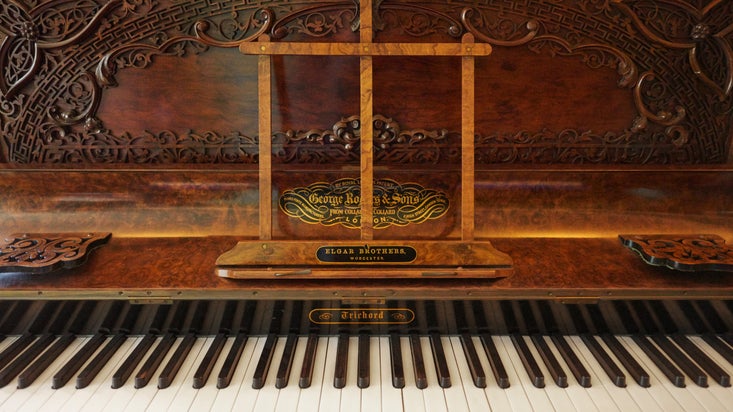
Become a member
Join today and help protect nature, beauty and history – for everyone, for ever. Enjoy access to more than 500 places with National Trust membership.
Birthplace of Sir Edward Elgar
Elgar’s Birthplace, Crown East Lane, Lower Broadheath, Worcestershire, WR2 6RH

| M | T | W | T | F | S | S |
|---|---|---|---|---|---|---|
Open
Closed
| Asset | Opening time |
|---|---|
| House | 10:00 - 16:30 |
| Visitor centre and Cottage Garden | 10:00 - 17:00 |
Café - During the dates we are open Little Al's Kitchen at The Firs will be open Friday, Saturday, Sunday and Monday from 10am-4.30pm. Last entry to the property is 4.30pm.
| Ticket type | With Gift Aid | Without Gift Aid |
|---|---|---|
| Adult (18+) | £12.10 | £11.00 |
| Child (5-17) under 5s free | £6.10 | £5.50 |
| Family (2 Adults and up to 3 children) | £33.30 | £27.50 |
| 1 Adult Family | £18.20 | £16.50 |
| Group (Adult 18+) | £10.45 | |
| Group (Child 5-17) | £5.23 |
Dogs are welcome on leads within all areas of the visitor centre, café and the cottage garden. Assistance dogs only in Cottage.
Designated mobility parking in main car park. Wheelchair access to visitor centre and garden - limited wheelchair access to cottage. Accessible toilet located in visitor centre.
Elgar’s Birthplace, Crown East Lane, Lower Broadheath, Worcestershire, WR2 6RH
Discover live music and special events taking place at The Firs, Elgar's Birthplace.

Spend time making music at The Firs, where the cottage and garden offer space to be creative. Use instruments and explore nature through outdoor activities that inspire play, discovery, and imagination.

At Little Al's cafe at The Firs you can be sure that every piping hot latte, sumptuous homemade cake and tasty brunch is served with a smile. They're proud winners of the Visit Worcestershire 2022 Ethical, Responsible, and Sustainable Tourism Award for their dedication to implementing the best ethical and environmental practices in their business.

Here’s everything you need to know about booking a group visit to the house and garden at The Firs.

The birthplace of Sir Edward Elgar, this small family home is set in the midst of a delightful cottage garden and with sight of the Malvern Hills. Stand within the four walls of the humble cottage where he was born and be immersed in a world that Elgar believed already contained music that was there for the taking.
Planted in the classic cottage garden style, the garden offers a place to sit, reflect, and admire a vast array of seasonal flowers and plants, throughout the year. There is also an orchard and woodland to explore.
Discover exhibitions giving a real insight into Elgar's world. With historic collection's including many of Elgar's personal belongings and artefacts, photographs, videos and interactive displays, there is so much to explore in our visitor centre.
Musical adventures await, with our family friendly outdoor Sound Garden and free to play piano in the visitor centre. Spend time outside in our pretty cottage garden and woodland areas, hunting for bugs in bug hotels and wild areas.
Visit Little Al's cafe at The Firs you can be sure that every piping hot latte, sumptuous homemade cake and tasty brunch is served with a smile. They're proud winners of the Visit Worcestershire 2022 Ethical, Responsible, and Sustainable Tourism Award for their dedication to implementing the best ethical and environmental practices in their business. Browse through The Firs large collection of quality second-hand books, CD’s and LP’s, all at great prices which help to support our work at The Firs.
Looking for a space to hire out? Here at The Firs, we have plenty of rooms to suit your needs. Our venue holds a unique place in British history as a site which honours the life of Sir Edward Elgar the man behind ‘Nimrod’ and ‘Land of Hope and Glory’. We have multiple spaces within our visitor centre which can be used to hire out and are perfect for classes, meetings, conferences and concerts. We are located just 4 miles (only a 10-minute drive!) from the city of Worcester. Email the.firs@nationaltrust.org.uk for more information.
Have a look to see what concerts and events we have coming up in 2026

Explore the cottage garden at The Firs, birthplace of Sir Edward Elgar. Discover seasonal borders, the Sound Garden, and sit beside Elgar’s statue as you take in views of the Malverns.

Spend time making music at The Firs, where the cottage and garden offer space to be creative. Use instruments and explore nature through outdoor activities that inspire play, discovery, and imagination.

The small family home which nurtured the creative genius of Sir Edward Elgar. Visit the cottage where he was born and learn more about his life and work in the visitor centre.

At Little Al's cafe at The Firs you can be sure that every piping hot latte, sumptuous homemade cake and tasty brunch is served with a smile. They're proud winners of the Visit Worcestershire 2022 Ethical, Responsible, and Sustainable Tourism Award for their dedication to implementing the best ethical and environmental practices in their business.

The Firs is a two pawprint rated place. Following Elgar’s great love of dogs, The Firs welcomes dogs on leads in the visitor centre, Little Al's Café and the gardens.

Explore the Worcestershire countryside around the village of Lower Broadheath, Elgar's birthplace, where the composer loved to roam, on an easy circular walk.


At the entrance to the Hanbury estate, this handsome lodge has miles of walking trails on the doorstep.

A second floor apartment within Hanbury Hall with stunning views over the 18th century Parterre.
Listen to cellist Corinne Frost playing cello music by British composers including Elgar. Corinne will also take music requests (classical or not) and might even create a sound portrait for you.
From Saturday 28 March to Sunday 12 April, hop into Spring this Easter at The Firs. Can you discover all ten activity stations and make the robin sing?
Experience Elgar’s iconic Cello Concerto in a recital by Corinne Frost and Janine Parsons, introduced by an engaging talk from Elgar expert Richard Westwood-Brookes. An immersive musical event offering fresh insight into this much‑loved masterpiece.
Join Volante Strings for an uplifting concert featuring cellist Corinne Frost in Boccherini’s Cello Concerto, plus Elgar’s Serenade and Janáček’s Suite for Strings. A beautiful hour of music.
Join us for a captivating day of British music, featuring beloved works by Elgar, Holst, Vaughan Williams, and more.
Experience a vibrant recital bursting with Spanish passion as Corinne Frost (cello) and Janine Parsons (piano) perform works by Villa-Lobos, Piazzolla, Ravel and Bizet, with insights from Richard Westwood-Brookes.
Discover the music that shaped Elgar’s genius in a recital by Corinne Frost and Clare Toomer, featuring the composers he most admired. With insights from Richard Westwood-Brookes, this programme reveals the influences behind Elgar’s voice.
The birthplace of Sir Edward Elgar is most definitely home to ‘Land of Hope and Glory’. Set in sight of his beloved Malvern Hills, this small family home in the village of Lower Broadheath is the perfect environment for nurturing a creative genius. Perhaps by wandering around the garden over the cottage threshold a spark of inspiration may alight in our welcomed guests.
Things to see and do: The Elgar Study Exhibition, The Birthplace Cottage, Cottage Garden and Visitor Centre.
Dogs: Assistance dogs welcome throughout the property. Dogs are welcome on leads everywhere except inside the Birthplace Cottage and Cafe.
Note: nearest toilet at visitor centre.
See how we care for our collection of objects from Elgar’s past, including the composer’s own piano.

Discover more about Elgar’s childhood garden and the work we do here.

Discover more about the Curating Elgar project, a project which looked to make his music relevant for a wider audience through musician-led community workshops and plan your visit to see Curating Elgar at The Firs.

Find out more about current volunteering opportunities at The Firs, and how you might get involved.


Join today and help protect nature, beauty and history – for everyone, for ever. Enjoy access to more than 500 places with National Trust membership.
By sharing your email address you’re agreeing to receive marketing emails from the National Trust and confirm you’re 18 years old or over. Please see our for more information on how we look after your personal data.